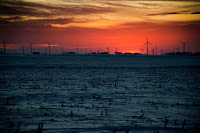With Donald J. Trump about to take control of the White House, it would seem a dark time for the renewable energy industry. After all, Mr. Trump has mocked the science of global warming as a Chinese hoax, threatened to kill a global deal on climate change and promised to restore the coal industry to its former glory.
So consider what happened in the middle of December, after investors had had a month to absorb the implications of Mr. Trump’s victory. The federal government opened bidding on a tract of the ocean floor off New York State as a potential site for a huge wind farm.
Up, up and away soared the offers — interest from the bidders was so fevered that the auction went through 33 rounds and spilled over to a second day. In the end, the winning bidder offered the federal Treasury $42 million, more than twice what the government got in August for oil leases — oil leases — in the Gulf of Mexico.
Who won the bid? None other than Statoil, the Norwegian oil company, which is in the midst of a major campaign to turn itself into a big player in renewable energy.
We do not know for sure that the New York wind farm will get built, but we do know this: The energy transition is real, and Mr. Trump is not going to stop it.
On a global scale, more than half the investment in new electricity generation is going into renewable energy. That is more than $300 billion a year, a sign of how powerful the momentum has become.
Wind power is booming in the United States, with the industry adding manufacturing jobs in the reddest states. When Mr. Trump’s appointees examine the facts, they will learn that wind-farm technician is projected to be the fastest-growing occupation in America over the next decade.
...
Now, of course, everything is in flux. In the worst case, with a sufficiently pliant Congress, Mr. Trump could roll back a decade of progress on climate change. Barring some miraculous conversion on Mr. Trump’s part, his election cannot be interpreted as anything but bad news for the climate agenda.
Yet despair might be an overreaction.
For starters, when Mr. Trump gets to the White House, he will find that the federal government actually has relatively little control over American energy policy, and particularly over electricity generation. The coal industry has been ravaged in part by cheap natural gas, which is abundant because of technological changes in the way it is produced, and there is no lever in the Oval Office that Mr. Trump can pull to reverse that.
The intrinsically weak federal role was a source of frustration for Mr. Obama and his aides, but now it will work to the benefit of environmental advocates. They have already persuaded more than half the states to adopt mandates on renewable energy. Efforts to roll those back have largely failed, with the latest development coming only last week, when Gov. John Kasich of Ohio, a Republican, vetoed a rollback bill.
The federal government does offer important subsidies for renewable energy, and they will surely become a target in the new Congress. But those subsidies are already scheduled to fall drastically over five years, in a deal cut a year ago that gave the oil industry some favors and that passed Congress with many Republican votes.
If Mr. Trump pushes for an early end to the subsidies, he will find that renewable energy has friends in the Republican Party. Topping that list is Charles E. Grassley, the senior senator from Iowa. That state — all-important in presidential politics, let us remember — will soon be getting 40 percent of its electricity from wind power.
“Senator Grassley has been and continues to be an extraordinary leader and champion for the wind industry,” said Tom Kiernan, the head of the American Wind Energy Association, a trade group.
By his group’s calculations, $80 billion of wind industry investment is in the pipeline for the United States over the next few years. “We are creating jobs throughout America, good-paying jobs, and we think President-elect Trump will want that to continue,” [Mr. Kiernan] said.
If Mr. Trump really wanted to roll back the clock, he could try to get Congress to override all the state mandates, a gross violation of the supposed conservative commitment to federalism. But it would be a titanic fight, some Republican senators would defect on principle, and Mr. Trump would almost certainly lose.
Read more at Weak Federal Powers Could Limit Trump’s Climate-Policy Rollback

No comments:
Post a Comment